-
 Art of Wellness Acupuncture & Traditional Chinese Medicine (TCM)11704 Wilshire Blvd, Suite 295, Los Angeles, CA, 90025
Art of Wellness Acupuncture & Traditional Chinese Medicine (TCM)11704 Wilshire Blvd, Suite 295, Los Angeles, CA, 90025
myartofwellness@gmail.com310-451-5522 Office Hours
MonClosedTue7:30 am --4 pmWed7:30 am --4 pmThu7:30 am -- 4 pmFri7:30 am -- 4 pmSat7:30 am -- 4 pmSunClosedOur office opens from Tuesdays to Saturdays 7:30 am to 4 pm, will be closed on Memorial day, Independent day, Labor day, Thanksgiving day, Christmas and New year.
-
Recent Posts
- How to Treat Shin Splints With Acupuncture and TCM
- How to Treat Dysautonomia With Acupuncture and TCM
- How to Treat Myofascial Pain Syndrome With Acupuncture and TCM
- How to Treat Costochondritis With Acupuncture and TCM
- How to Treat Ankylosing Spondylitis With Acupuncture and TCM
- How to Treat Gastroparesis With Acupuncture and TCM
- How To Treat Sleep Apnea With Acupuncture and TCM
- How To Treat Baker’s Cyst With Acupuncture and TCM
- How to Treat Sinusitis With Acupuncture and TCM
- How To Treat Sjogren’s Disease With Acupuncture and TCM
- How to Treat Raynaud’s Syndrome With Acupuncture and TCM
- How to Treat Autoimmune Disorders With Acupuncture and TCM
- Sign up to receive news and updates and get my free report:“The Top 10 Reasons to Try Acupuncture”

May 2024 M T W T F S S 1 2 3 4 5 6 7 8 9 10 11 12 13 14 15 16 17 18 19 20 21 22 23 24 25 26 27 28 29 30 31
Stress
How To Treat Sjogren’s Disease With Acupuncture and TCM
By Qineng Tan, L.Ac., Ph.D. and Xiaomei Cai, L.Ac., Ph.D.
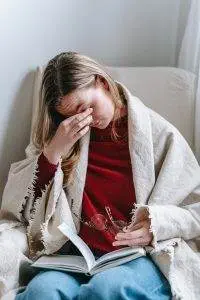
Dry mouth? Dry eyes? Joint pain that flares up and then goes away? These can be Sjogren’s disease symptoms. Sjogren’s Syndrome is an autoimmune disease that causes damage to the glands that produce saliva and tears. Acupuncture and TCM provide an alternative Sjogren’s treatment to help relieve Sjogren’s syndrome symptoms.
Sjogren’s autoimmune disease is becoming more common, with an estimated four million Americans affected.
Many people with Sjogren also have another autoimmune disorder, such as rheumatoid arthritis, scleroderma, or lupus. In these cases, it is called Secondary Sjogren’s syndrome.
Anyone can develop Sjogren’s syndrome, but it is much more prevalent among women, and in people over the age of 40.
What causes Sjogren’s disease? As with most autoimmune diseases, medical research has not discovered the exact cause of Sjogren’s syndrome. The immune system, which normally works to get rid of bacteria or other pathogens, sometimes malfunctions and begins attacking healthy cells.
In the case of Sjogren’s, the immune system mistakenly attacks cells of the salivary glands and the glands that produce tears. When these glands become inflamed and/or damaged, they no longer produce enough fluid to keep the eyes and mouth lubricated.
Acupuncture treatment can be a safe and effective way to help relieve symptoms of dry mouth (also known as xerostomia), dry eyes, fatigue, and joint pain.
Top 10 Sjogren’s Syndrome Symptoms
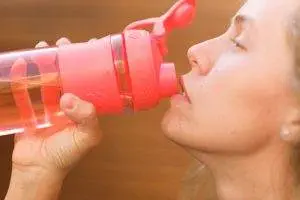
As with other autoimmune disorders, the symptoms of Sjogren’s disease can seem to come and go, or “flare up” periodically. A Sjogren’s flare is a sudden onset of symptoms that occurs when you’ve been feeling better for a while, and then something like work stress or doing too much can suddenly make you feel extreme fatigue and other symptoms.
The most common Sjogren’s Disease symptoms include:
- Dry mouth, dry throat, difficulty swallowing, “cotton mouth”
- Dry eyes, gritty eyes, burning, itchy eyes, sensitivity to light, blurred vision
- Joint pain, stiff joints, swollen joints
- Dry skin, skin rash
- Loss of taste, can’t taste, things taste different
- Dental cavities, oral thrush, oral yeast infections
- Mouth ulcers
- Dry cough, persistent cough
- Vaginal dryness
- Fatigue
Sometimes Sjogren’s can cause peripheral neuropathy, or tingling and numbness in the hands and feet. Some people may experience acid reflux, swollen glands, cognitive difficulties, like poor short term memory, shortness of breath, and trouble sleeping.
Less common but more serious complications of Sjogren’s disease can include a higher risk factor for getting pneumonia, kidney problems, and liver disease, like cirrhosis or hepatitis. In rare cases, people with Sjogren’s syndrome can develop lymphoma (cancer of the lymph nodes).
Medical treatment for Sjogren’s Syndrome is mostly about managing symptoms, so that a person can live comfortably.
Sjogren’s Treatment

Managing Sjogren’s symptoms like dry eyes and joint pain is the primary aim of medical treatment for Sjogren’s.
Dryness is the most common symptom of Sjögren’s, and one of the primary approaches to managing dry eyes and dry mouth involves moisture replacement therapies. Artificial tears and lubricating eye drops help alleviate dry eyes, while saliva substitutes and frequent sips of water can provide relief for dry mouth.
Medications that stimulate saliva production, such as pilocarpine or cevimeline, may be prescribed. These drugs can help improve saliva flow, but they can also cause side effects, like dizziness and headaches.
Nonsteroidal anti-inflammatory drugs (NSAIDs) may be recommended to manage pain and inflammation associated with Sjögren’s syndrome. In more severe cases, corticosteroids, which act as anti-inflammatories, may be prescribed. However, long-term use of steroid medications does, in many cases, cause unwanted side effects, increasing the risk of developing problems like cataracts, osteoporosis, and problems with blood sugar.
Immunosuppressive medications, such as hydroxychloroquine or methotrexate, are often prescribed for autoimmune diseases, to dampen the immune response. These drugs aim to reduce inflammation and alleviate symptoms, particularly in cases where there are complications involving organs like the kidneys or liver.
In cases where joint pain and inflammation are present, disease-modifying antirheumatic drugs (DMARDs) like methotrexate may be considered. These drugs work to modify the course of the disease and manage systemic symptoms.
Acupuncture and Chinese herbal supplements have been shown to work as an effective alternative or adjunct treatment for Sjogren’s disease.
Can Acupuncture Help Sjogren’s Syndrome?

Many diseases and syndromes have a variety of possible symptoms, which show up differently in different people. In TCM, we recognize that sometimes people can have the same sort of disorder, but with different patterns of symptoms, which give us clues about what sort of internal imbalance is causing the disorder. Thus, an acupuncturist will create a unique treatment plan for each individual patient.
According to TCM theory, Sjogren’s disease symptoms can be related to Yin deficiency, and a pattern of dry heat. Acupuncture and herbs can help to nourish and strengthen Yin, and bring more moisture to the organ systems.
In other cases, though, there may be dampness, stasis, or Qi deficiency. Herbs to strengthen the liver and help relieve depressed Qi may be used, and/or herbs to tonify the spleen, to help clear dampness.
One systematic review of clinical trials found that a Chinese herbal formula was superior to Hydroxychloroquine for helping to alleviate Sjogren’s symptoms.
A study comparing patients with Sjogren’s treated with hydroxychloroquine versus those who received acupuncture treatment and herbs found that the group who received TCM treatment for Sjogren’s had an 83% effective rate, versus a 60% effective rate among the people who took the immunosuppressant medication. This study measured saliva and tear production as well as immune system function.
It has been hypothesized that acupuncture treatment has a positive effect on the parasympathetic nervous system, helping promote relaxation and move patients out of a “fight or flight” mode, which, in turn, can help to restore natural salivation and improve appetite.
Another study found that Sjogren’s patients who received acupuncture to help dry eye symptoms reported that they were able to greatly reduce their use of artificial tears after receiving a course of acupuncture, and were still feeling these benefits several months after treatment.
Acupuncture Near Me for Sjogren’s Disease in Los Angeles, West L.A.
Acupuncture and TCM offer holistic treatment for Sogren’s syndrome and other autoimmune diseases. An experienced acupuncture provider can create a personalized health care plan for each patient that addresses their unique needs and situation. Dr. Tan and Dr. Cai at Art of Wellness in West Los Angeles have over 35 years of experience helping patients get relief from symptoms like joint pain and fatigue, and improving their quality of life.
*This article is for education from the perspective of Traditional Chinese Medicine only. The education provided by this article is not approved by FDA to diagnose, prevent, treat and cure human diseases. It should not stop you from consulting with your physician for your medical conditions. Traditional Chinese Medicine is based on Qi, which is an invisible force that usually cannot be observed by modern science. Because science focuses on testing ideas about the natural world with evidence obtained through observation, these aspects of acupuncture can’t be studied by science. Therefore acupuncture and Chinese herbs are often not supported by double-blind, randomized trials, and they are considered alternative medicine therapies in the United States.
How to Treat Raynaud’s Syndrome With Acupuncture and TCM
By Qineng Tan, L.Ac., Ph.D. and Xiaomei Cai, L.Ac. Ph.D.

Fingers numb? Numbness in fingers and toes? Fingers turning white, poor circulation in fingers, cold fingers and toes? Raynaud’s disease, or Raynaud’s phenomenon, causes poor circulation in the extremities due to constriction of the blood vessels, usually triggered by cold weather or stress. Acupuncture can help relieve Raynaud’s disease symptoms.
Raynaud’s disease is a condition characterized by occasional narrowing of the blood vessels, primarily in the fingers and toes. The small arteries that supply blood to the skin of the fingers and toes (and sometimes, to the ears and the tip of the nose) become constricted in cold conditions.
Raynaud’s syndrome causes the tips of the fingers and/or toes to turn white due to the lack of circulation, and there may be numbness in fingers or tingling in toes. A “Raynaud’s attack” or episode lasts until the person warms up, at which point, there may be a burning sensation, and the affected skin may flush and turn red as blood flow returns.
Raynaud’s can occur in two forms: primary and secondary.
Primary Raynaud’s, also called Raynaud’s disease, is the more common form and isn’t usually related to another medical condition. Raynaud’s is considered to be an exaggerated response to cold, emotional stress or anxiety, leading to spasms in the small arteries.
People with primary Raynaud’s phenomenon usually begin to experience symptomatic episodes during their teenage years. Women are more likely to have Raynaud’s.
Secondary Raynaud’s is less common but more serious. It is associated with other diseases, typically autoimmune diseases or connective tissue disorders, like scleroderma, rheumatoid arthritis, thyroid disorders, or lupus.
Secondary Raynaud’s can be linked to conditions that directly damage the arteries or affect blood flow, like carpal tunnel syndrome. In these cases, it is considered a symptom rather than a separate condition.
Raynaud’s Syndrome Causes
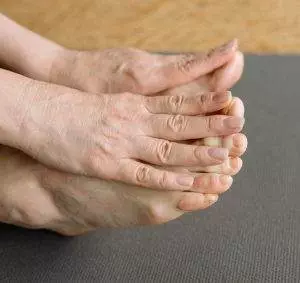
For most people with Raynaud’s syndrome, there is probably a combination of genetic, physiological, and environmental factors at play.
Vascular abnormalities, or dysfunction in the blood vessels, involving excessive narrowing (vasospasm) and poor dilation in response to stimuli, may be involved.
Overactivity of the nerves controlling the blood vessels (sympathetic nervous system) may cause spasms.
Raynaud’s can tend to run in some families. If someone is already susceptible, then the numbness in fingers and toes may be triggered by cold temperatures, or a stressful situation. Smoking cigarettes can also cause Raynaud’s symptoms.
In secondary Raynaud’s, underlying autoimmune conditions can lead to inflammation and damage to blood vessels.
An injury to one of the limbs, like a broken wrist, or damage to the tissues from frostbite, could also trigger Raynaud’s phenomenon.
Some prescription medications, such as beta blockers, ADHD medications, medications for migraine headaches, and even some cold and flu medicines, could cause Raynaud’s symptoms.
Acupuncture treatment can help to relieve Raynaud’s syndrome symptoms and also address the underlying condition that may cause Raynaud’s.
Top 10 Raynaud’s Disease Symptoms
Raynaud’s symptoms may show up differently for each person. Symptoms of Raynaud’s disease can vary in severity and may include:
- Skin changes color: pallor (pale skin, white skin, or yellow skin) in the affected fingers or toes during an episode
- In rare cases, Raynaud’s phenomenon can affect other areas, such as the nose, ears, and lips.
- Some people may experience Raynaud’s in their nipples, which can cause a severe throbbing pain.
- Bluish discoloration (Cyanosis) as blood flow decreases
- Affected areas feel cold and/or numb during an episode
- Throbbing or tingling in the fingers or in the toes
- Sensitivity to cold temperatures, leading to more frequent episodes in cold weather.
- In severe cases, recurrent or persistent episodes of reduced blood flow can lead to skin sores or ulcers, particularly on the fingertips or toes.
- Changes in the texture and color of the nails, including nail beds that turn white and then blue during an episode.
- Some individuals may experience joint pain, particularly if there is an underlying connective tissue disorder.
Emotional stress, anxiety, or rapid changes in temperature can trigger Raynaud’s symptoms.
Raynaud’s disease is generally considered a benign condition, but repeated episodes can lead to more serious problems, like skin sores, chilblains, or even gangrene, which can cause permanent damage to tissues.
Raynaud’s Syndrome Treatment

Diagnosis of Raynaud’s disease may involve a test called nailfold capillaroscopy. This is a non-invasive test that allows the doctor to see the capillary size and action in the tips of the fingers and nail bed. This can help to determine whether the person has Primary Raynaud’s, or may have a connective tissue disorder, like lupus or Sjogren’s syndrome.
The standard medical treatment for Raynaud’s phenomenon aims to manage symptoms, improve blood flow, and prevent complications. While there is no cure for Raynaud’s, various medications and lifestyle modifications can be employed to alleviate symptoms and enhance circulation.
Medications that relax and widen blood vessels, known as vasodilators, are commonly prescribed. Calcium channel blockers, such as nifedipine, are often used to help dilate the small blood vessels in the extremities, reducing the frequency and severity of Raynaud’s episodes.
Phosphodiesterase inhibitors like sildenafil (which is also commonly prescribed to help erectile dysfunction, ED) can sometimes be beneficial in promoting blood vessel dilation and improving blood flow.
In some cases, topical nitroglycerin cream may be prescribed to increase blood flow to the affected areas.
Endothelin receptor antagonists, such as bosentan, may be considered in cases where blood vessel constriction is severe. These medications target endothelin, a substance that can cause blood vessels to narrow.
Antiplatelet agents like aspirin may be recommended to reduce the risk of blood clots and improve blood circulation.
If Raynaud’s is secondary to another condition, treating the underlying cause is crucial. For example, if it is associated with an autoimmune disorder, immunosuppressants might be considered.
Lifestyle changes play a significant role in managing Raynaud’s symptoms. Patients are typically advised to dress warmly.
Quitting smoking is strongly recommended, as smoking constricts blood vessels.
Can Acupuncture Help Raynaud’s Syndrome?
TCM has acknowledged Raynaud’s phenomenon as a condition of severe cold in the limbs for centuries. According to TCM theory, a deficiency of Qi and blood circulation is the root cause of Raynaud’s symptoms. In TCM, we consider that Qi (life force energy) and blood work together; Qi moves the blood throughout the body, and blood carries the Qi throughout the body.
In TCM, we are always looking at both external factors and internal factors that contribute to a condition. In the case of Raynaud’s disease, cold acts as a pathogenic factor that can be already present inside the body, and then, when a person is exposed to cold temperatures as an external factor, this triggers an extreme reaction.
So, in many cases, a person suffering from Raynaud’s is already dealing with too much cold and poor blood circulation. Herbs can be used to help warm the body internally and increase blood flow.
Some people develop Raynaud’s symptoms in response to stress. In this case, the liver may be involved. In TCM, the liver is associated with strong emotions, and when the liver is distressed, it can trigger muscular contractions that squeeze the blood vessels, restricting blood flow. In these cases, we will use herbal formulas and acupuncture points to help restore balance in the liver.
When there is an autoimmune disease also present, such as scleroderma or lupus, then there may also be blood stasis, and a thickening of the blood and tissues. TCM can address those conditions at their roots, as well.
An acupuncturist will make careful observations about how each individual is experiencing Raynaud’s symptoms, and address it according to the pattern presenting.
Top 3 Tips for Managing Raynaud’s Syndrome Symptoms

You can help prevent Raynaud’s attacks by keeping your whole body warm, especially your hands and feet.
- Protect your hands and feet. Wear mittens or gloves, thick socks and lined boots, and use hand and foot warmers in cold weather. Consider wearing gloves or oven mitts when reaching into the refrigerator or freezer.
- Exercise regularly, both to stimulate healthy blood circulation, and to help manage stress levels.
- If hands and/or feet do begin to feel cold or numb, take action to warm them up immediately by wiggling them, running them under warm water, massaging them, or putting your hands in your armpits or against your abdomen under your clothing.
Acupuncture Near Me for Raynaud’s Syndrome in West Los Angeles
It is important to address Raynaud’s disease to avoid damage to the nerves and skin tissue in your extremities, and to be sure whether or not Raynaud’s symptoms are related to an underlying autoimmune disorder. The acupuncturists at Art of Wellness Acupuncture in West L.A. have over 35 years of experience helping people with autoimmune conditions, circulatory problems, and nerve pain and tingling. The combination of herbs and acupuncture treatment can help relieve Raynaud’s phenomenon symptoms and address any autoimmune disease or nerve conditions.
*This article is for education from the perspective of Traditional Chinese Medicine only. The education provided by this article is not approved by FDA to diagnose, prevent, treat and cure human diseases. It should not stop you from consulting with your physician for your medical conditions. Traditional Chinese Medicine is based on Qi, which is an invisible force that usually cannot be observed by modern science. Because science focuses on testing ideas about the natural world with evidence obtained through observation, these aspects of acupuncture can’t be studied by science. Therefore acupuncture and Chinese herbs are often not supported by double-blind, randomized trials, and they are considered alternative medicine therapies in the United States.
How To Treat Addison’s Disease With Acupuncture and TCM
By Qineng Tan, L.Ac,. Ph.D. and Xiaomei Cai, L.Ac., Ph.D.

Always tired? Craving salty foods? Thirsty all the time? Adrenal fatigue? Addison’s disease is a condition in which the adrenal glands do not produce enough cortisol. Acupuncture and TCM can help to balance the adrenal hormones and relieve adrenal insufficiency symptoms.
Addison’s, also known as adrenal insufficiency, happens because of damage to the adrenal glands. What do the adrenal glands do? The adrenals are small glands that are located just above the kidneys. They produce hormones, including cortisol and aldosterone. These hormones are important in metabolic functions, and are also a big part of our stress response.
Cortisol is released from the adrenal glands into the bloodstream, and it aids in the body’s use of macronutrients: protein, carbohydrates, and fats. Cortisol regulates blood pressure and blood sugar levels, and it also gives us an extra energy boost when we need it because of sudden and/or stressful circumstances.
In many cases, Addison’s disease is the result of an autoimmune disorder. In these cases, the immune system mistakenly attacks the adrenal cortex, the part of the adrenal glands that produce cortisol and aldosterone.
In some parts of the world, tuberculosis infection is still common, and tuberculosis can lead to damage of the adrenal glands.
Other infectious diseases like HIV/AIDS, or fungal infections like histoplasmosis, can cause adrenal damage.
People with other autoimmune diseases may be more susceptible to developing Addison disorder, too. For example, Addison’s disease can happen concurrently with:
- Dermatitis herpetiformis
- Graves disease
- Type 1 diabetes
- Pernicious anemia
- Hashimoto’s disease, thyroiditis
- Vitiligo
- Myasthenia gravis
Some people may develop Addison’s disease in addition to having hypothyroidism or diabetes.
Addison’s Disease Symptoms
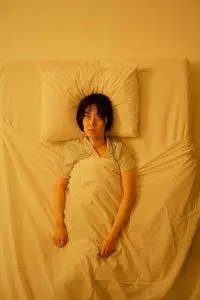
In the early stages, Addison’s disease symptoms may feel like a flu, causing fatigue, muscle weakness and joint pain. But as the illness progresses, these symptoms may become chronic.
Adrenal insufficiency symptoms include:
- Extreme fatigue
- Dehydration
- Loss of appetite
- Unexplained weight loss
- Darkening of skin in areas, hyperpigmentation, darkening of gums
- Blue-black color to skin around mouth, nipples, or genitals
- Low blood pressure, hypoglycemia
- Dizziness
- Fainting, light-headedness
- Craving salt
- Abdominal pain
- Nausea, vomiting
- Diarrhea
- Joint pain
- Muscle pain
- Depression
- Irritability
- Loss of body hair
- Sexual problems
- Irregular periods, no menstrual periods, missed periods
Primary ovarian insufficiency (POI), has been found to be more common among those with Addison’s disease, with about 1 in 10 women with Addison’s going through early menopause (before 40).
In extreme situations, Addison’s sickness can lead to kidney failure, or going into shock. Early warning signs of adrenal crisis include nausea, fever, headache, and confusion. This sudden worsening of Addison’s disease is known as Adrenal crisis, and requires immediate medical attention.
Medical Treatment for Addison’s Disease
Accurate diagnosis and appropriate treatment are crucial for individuals with Addison’s disease.
A doctor will typically diagnose Addison’s disease through blood tests. These tests measure the levels of cortisol and aldosterone in the blood. Low levels of these hormones are indicative of adrenal insufficiency.
If blood tests suggest adrenal insufficiency, an ACTH stimulation test may be performed. In this test, synthetic adrenocorticotropic hormone (ACTH) is administered, and cortisol levels in the blood are measured. Patients with Addison’s disease typically do not show a significant increase in cortisol after receiving ACTH.
The primary treatment for Addison’s disease involves hormone replacement therapy. Patients are prescribed synthetic cortisol (usually hydrocortisone or prednisone) to replace the insufficient natural cortisol production.
If aldosterone production is also insufficient, patients may be prescribed fludrocortisone to replace this hormone. This helps regulate salt and water balance in the body.
Dosage and frequency of cortisol replacement are adjusted to meet the specific needs of each patient. Patients often need to take multiple doses of medication daily to mimic the body’s natural cortisol rhythms.
These steroid medications can cause side effects like dizziness, nausea, and changes in the menstrual cycle.
Patients with Addison’s disease require ongoing medical supervision to monitor hormone levels, adjust medication as needed, and ensure that they are responding well to treatment.
Acupuncture offers an adjunct or alternative treatment for Addison’s disease that can help regulate hormones.
Can Acupuncture Help Addison’s Disease?
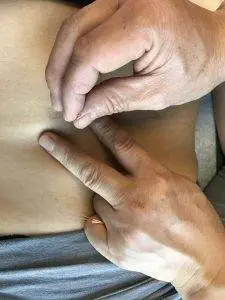
According to TCM theory, the kidneys are responsible for storing and controlling not only Qi, but “essence,” which represents a person’s foundational life force energy.
Addison’s disease, or adrenal insufficiency, is usually related to some variation of kidney deficiency according to TCM diagnosis.
Possible TCM diagnosis for Addison’s might be:
- kidney qi deficiency
- kidney yang deficiency
- kidney yin deficiency
- liver yin deficiency
- spleen blood deficiency
- spleen yang deficiency
By listening to a person’s range of symptoms, an acupuncturist will determine which pattern is emerging, and choose acupuncture points to bring energy and strength to the affected organs.
Moxibustion treatment is also an excellent modality to help build up Kidney Qi and blood.
Chinese herbs can help nourish and support kidney Qi.
For some people, acupuncture treatment and herbal supplements can be a good alternative treatment for Addison’s disease. For others, TCM treatment for adrenal insufficiency can be used as an adjunct to conventional treatment, and help to alleviate side effects of steroids, like dizziness, nausea, or menstrual changes.
Acupuncture Near Me for Addison’s Disease in West Los Angeles
Acupuncture can help address autoimmune diseases that are difficult for conventional medicine to treat. TCM modalities, including moxibustion and herbs, can provide a holistic treatment that works on the root level, restoring proper function of the immune system, as well as helping to relieve all kinds of symptoms.
Addison’s disease requires an individualized approach. Dr. Tan and Dr. Cai at Art of Wellness Acupuncture have over three decades of experience helping patients overcome all types of autoimmune disorders. Art of Wellness was recently named one of the top acupuncture practices in Los Angeles. Please do not hesitate to call us.
*This article is for education from the perspective of Traditional Chinese Medicine only. The education provided by this article is not approved by FDA to diagnose, prevent, treat and cure human diseases. It should not stop you from consulting with your physician for your medical conditions. Traditional Chinese Medicine is based on Qi, which is an invisible force that usually cannot be observed by modern science. Because science focuses on testing ideas about the natural world with evidence obtained through observation, these aspects of acupuncture can’t be studied by science. Therefore acupuncture and Chinese herbs are often not supported by double-blind, randomized trials, and they are considered alternative medicine therapies in the United States.
How To Treat Psoriasis With Acupuncture and TCM
By Xiaomei Cai, L.Ac., Ph.D. and Qineng Tan, L.Ac., Ph.D.

Rash, scaly skin, itchy skin? These could be signs of psoriasis, a chronic skin condition that causes skin to form in thick, scaly, discolored patches, especially on the elbows and knees. Acupuncture and TCM treatment can help relieve psoriasis and address the root causes of this autoimmune skin disease.
Autoimmune disorders stem from the body’s immune system malfunctioning. In the case of psoriasis, the body produces too many skin cells, forming thick scales, known as “plaques,” or a bumpy rash.
As with other conditions that involve skin rashes or other skin problems—like vitiligo, eczema, dermatitis, scleroderma, celiac disease, and lupus—psoriasis tends to flare up periodically, becoming worse for a few weeks or months at a time, and then improving. A psoriasis flare up happens because of widespread inflammation.
What Causes Psoriasis Flare Ups?
Getting a cut or burn on your skin can trigger a psoriasis flare up.
So can infections like a staph infection, strep infection, helicobacter pylori bacterial infection (which can also cause stomach ulcers), or chlamydia.
Viral infections like HIV and hepatitis C can trigger psoriasis. Fungal infections like candida, or yeast infections, can also trigger a psoriasis flare up.
Psoriasis affects millions of people, of all ages. Psoriasis rash can cause intense itching (pruritus), so much so that it can affect a person’s ability to concentrate in daily life and can also have a negative impact on sound sleep.
Medical research has not yet discovered exactly what causes psoriasis, but it may be partly due to genetics and partly due to environmental factors. It is not uncommon for a person to have psoriasis and also have another autoimmune condition, such as lupus, celiac disease, Crohn’s disease or inflammatory bowel disease (IBD), multiple sclerosis (MS), or autoimmune thyroid disease.
Acupuncture and TCM are excellent modalities for helping to relieve the symptoms of skin conditions like psoriasis and many autoimmune disorders. Acupuncture and herbs can help relieve itchy rashes and also help to improve the functioning of the immune system. Acupuncture treatment can also help with the emotional and psychological toll of dealing with psoriasis.
Top 5 Types of Psoriasis
Plaque psoriasis is by far the most common type of psoriasis, accounting for about 80% of cases. Other types of psoriasis are more rare and can be very serious.
- Plaque psoriasis or Psoriasis vulgaris – the most common type of psoriasis; thick scales that are red or pink with a silvery coating on them. These patches, or plaques, can itch intensely.
- Guttate psoriasis – small red or pink bumps that appear suddenly, covering the torso, arms, and/or legs. This condition sometimes clears up and does not return. In some cases, though, it can keep coming back, or later turn into plaque psoriasis. Guttate psoriasis may be triggered by infections, like strep throat.
- Pustular psoriasis – this is a rash of painful bumps that are filled with pus. Generalized pustular psoriasis is an extreme version of this condition, which can quickly cover the whole body and be accompanied by other symptoms like fever, headache, and muscle weakness. Generalized pustular psoriasis is a serious condition requiring medical care.
- Inverse psoriasis or Intertriginous psoriasis – develops in areas where skin folds upon itself, like armpits and around the genital area
- Erythrodermic psoriasis – usually develops as a more severe condition after a person has already been struggling with psoriasis. The skin becomes very red and appears to be burned. The person will feel very ill, with fever and chills and a rapid heart rate. Requires immediate medical attention.
Psoriasis is not only intensely uncomfortable, but the scaly skin can also have a significant impact on a person’s confidence in their appearance. These factors can mean that having psoriasis can have a negative effect on a person’s mental health and emotional health.
Acupuncture, when used as an adjunct therapy for psoriasis and other autoimmune conditions can help address anxiety, depression, and mood disorders, as well as helping with physical symptoms.
Medical Treatments for Psoriasis
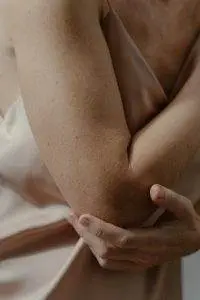
Conventional treatment for psoriasis aims to help slow down the overproduction of skin cells and relieve pain and itching.
Topical Medications for Psoriasis
Topical products are applied directly to the skin.
- Corticosteroids: Frequently prescribed for mild to moderate psoriasis, available in various forms like oils, creams, lotions, etc.
- Vitamin D Analogues: Synthetic forms of vitamin D that slow skin cell growth, used alone or with corticosteroids.
- Retinoids: Available as gel or cream, they reduce skin cell growth and may cause skin irritation and sensitivity to light.
- Calcineurin Inhibitors: Calm the rash and reduce scaly buildup, useful in areas of thin skin.
- Salicylic Acid: Reduces scaling of scalp psoriasis and prepares the scalp to absorb medication more easily.
- Coal Tar: Reduces scaling, itching, and inflammation, available in various forms like shampoo, soap, cream, and oil.
Oral or Injected Medications for Psoriasis
Systemic medications may work on the immune system or on skin cell production to help relieve psoriasis.
- Steroids: Injection of triamcinolone into small, persistent psoriasis patches.
- Retinoids: Pills to reduce skin cell production, not recommended during pregnancy.
- Biologics: Injected drugs that alter the immune system to improve symptoms in moderate to severe psoriasis.
- Methotrexate: Weekly oral dose to decrease skin cell production and suppress inflammation.
- Cyclosporine: Oral calcineurin inhibitor for severe psoriasis.
- Treatment approach based on needs and psoriasis severity.
- Start with milder treatments and move on to stronger ones if necessary.
- Pustular or erythrodermic psoriasis may require stronger systemic medications.
Phototherapy exposes the skin to ultraviolet light under a dermatologist’s supervision. UVB can help slow down cell production. Light therapy may use lamp units with bulbs, or a laser may be used to target very specific areas of affected skin.
Can Acupuncture Help Psoriasis?
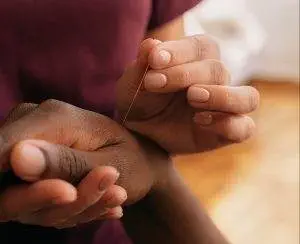
In TCM, elemental factors like heat, wind, dampness, dryness, and so on, are considered to act as pathogens, having a negative effect on bodily systems when they are either in excess or deficient.
According to TCM theory, the root causes of psoriasis may be related to pathogenic factors of excessive heat and dryness. Heat, as a pathogen, can cause redness and itchy skin. Wind can cause dryness of the blood. These conditions in combination can lead to stagnant blood and a fiery heat building up. TCM classifications for diagnosis related to psoriasis would include:
- Blood heat
- Blood stasis
- Blood dryness
- Blood deficiency
An individual, depending on their specific presentation of skin rash and other symptoms, may be diagnosed with a combination of these factors.
In Chinese medicine, the skin and the lungs are connected, with the skin being the outward presentation of what is going on in the lungs. So, acupuncture treatment for psoriasis may focus on strengthening lung Qi.
In other cases, the large intestine may be related; because of dryness, it may not be receiving enough fluid to be able to do the job of moving toxins out of the body.
In some cases, it may be that intense emotions are affecting the liver, causing blood stagnation due to stress. Liver Qi stagnation can cause overheating and for blood to “overflow” from vessels, causing red bumpy rashes.
Thus, herbal remedies and acupuncture treatment will often aim to clear heat, cool the blood, and improve circulation. Many herbs are helpful for this, as well as for helping to reduce inflammation and soothe dryness and itching.
Chinese medicine herbal preparations have been shown by modern scientific studies to inhibit immune-inflammatory reactions, regulate Th cells, and mediate the formation of skin lesions.
Review of scientific studies of TCM for psoriasis have shown that it can be effective for reducing the severity of skin lesions and help prevent recurrences of flare ups.
Acupuncture Near Me for Psoriasis in West Los Angeles
Psoriasis is a painful skin condition that requires special treatment. As an autoimmune condition, psoriasis needs to be addressed on a deeper level, as opposed to simply trying to relieve the itchy, scaly rash on the skin’s surface. TCM offers a holistic way of treating both skin diseases and autoimmune disorders that can bring deep relief. Consider seeking acupuncture as an adjunct treatment for psoriasis.
*This article is for education from the perspective of Traditional Chinese Medicine only. The education provided by this article is not approved by FDA to diagnose, prevent, treat and cure human diseases. It should not stop you from consulting with your physician for your medical conditions. Traditional Chinese Medicine is based on Qi, which is an invisible force that usually cannot be observed by modern science. Because science focuses on testing ideas about the natural world with evidence obtained through observation, these aspects of acupuncture can’t be studied by science. Therefore acupuncture and Chinese herbs are often not supported by double-blind, randomized trials, and they are considered alternative medicine therapies in the United States.
How to Treat Scleroderma With Acupuncture and TCM
By Xiaomei Cai, L.Ac., Ph.D. and Qineng Tan, L.Ac., Ph.D.
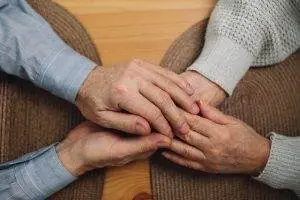
Hard, thickening, tight skin? Itchy, dry skin that is shiny? Changing skin color? These could be symptoms of scleroderma, an autoimmune disorder that causes your body to produce too much collagen. Acupuncture and TCM treatment can help relieve inflammation and pain while helping to resolve the underlying cause of scleroderma.
Scleroderma can be considered a type of dermatosis (skin lesion), and also a type of connective tissue disease (negatively impacting tissues that connect structures in the body), as it usually affects skin and cartilage, often starting in the extremities, and then extending up the limbs towards the trunk.
Collagen is a form of fibrous protein that the body produces to maintain the structure of skin cells, muscles, bones, and connective tissue. The immune system triggers collagen production when we are injured, but in the case of scleroderma, the body is overproducing and accumulating too much collagen.
Localized scleroderma affects primarily the skin tissue, but can also spread to subcutaneous tissues, like fascia and muscles.
In some cases, scleroderma can also impact internal organs, like the esophagus, lungs, heart, and kidneys. This is known as systemic scleroderma.
Top 3 Types of Scleroderma
Localized scleroderma can be differentiated into 3 types:
- Localized scleroderma – a few patches of discolored skin (circumscribed morphea); these skin lesions can vary in size, may be oval shaped, and are usually yellow in the center with a red border.
- Generalized scleroderma – also called generalized morphea, with this type there are more patches of thick, hard skin on various parts of the body, which may overlap.
- Linear scleroderma – more common in children, may show up as one band of affected skin on a limb or on the trunk, with a few patches of morphea. Linear scleroderma on arms and legs may affect the growth and development of that limb, as scleroderma may impact the muscle and bone tissues as well as the skin.
Systemic scleroderma is rare, but happens more commonly in women between the ages of 30 and 50. This type of scleroderma can manifest in different ways.
Systemic scleroderma can sometimes first show up as Raynaud’s phenomenon, or Raynaud’s syndrome, in which the blood vessels in the hands and feet close up when the weather is cold and cause color changes to the skin, as well as sensations of numbness, prickling, tingling, or pain. Stress can also trigger Raynaud’s.
Systemic scleroderma can cause scarring on the skin and internal organs, which can lead to gastrointestinal problems like acid reflux, cardiovascular and pulmonary problems, or renal disease.
Acupuncture treatment can be used as an adjunct treatment to help relieve symptoms of pain related to skin hardening, as well as helping to alleviate heartburn and GERD type symptoms in patients with esophageal symptoms of scleroderma. TCM can also help address the root causes of scleroderma and other autoimmune disorders.
What Causes Scleroderma?

As with most autoimmune disorders, medical science has not yet discovered exactly why some people develop this condition. While it is not passed from parent to child the way genetic diseases are, you are more likely to have scleroderma if someone else in your immediate family has it, too.
It is believed that factors like environmental toxins and/or viral infections can trigger scleroderma symptoms to flare up. The overproduction of collagen is due to abnormal functioning of the immune system.
Because women develop scleroderma more often than men do, it may be that there is a hormonal factor that affects the disease, as well.
Diagnosis and Medical Treatment for Scleroderma
There is no cure for scleroderma, so conventional medical treatments aim to alleviate symptoms and slow down the progression of the disease. The treatment plan may vary depending on the specific manifestations and severity of the disease.
To diagnose scleroderma, doctors rely on a combination of clinical assessments, medical history review, physical examinations, and lab tests. A doctor will first observe skin changes, such as thickening and hardening, then look for internal organ involvement and other symptoms.
Blood tests can help identify specific antibodies associated with scleroderma, such as antinuclear antibodies (ANA), anti-centromere antibodies (ACA), and anti-Scl-70 (anti-topoisomerase I) antibodies. Additionally, blood tests can assess organ function, including kidney and liver function, as well as inflammatory markers.
X-rays, ultrasound, or CT scans may be used to evaluate internal organ involvement, such as lung fibrosis, gastrointestinal complications, and cardiac abnormalities.
A skin biopsy sample may be taken to confirm the presence of fibrosis and assess the degree of inflammation.

Medications that may be recommended for treating scleroderma symptoms include:
- Immunosuppressants: Medications such as methotrexate, mycophenolate mofetil, and azathioprine may be prescribed to suppress the immune response and reduce inflammation.
- Corticosteroids: Oral or topical corticosteroids can help manage inflammation and alleviate symptoms in certain cases. However, long-term use may have potential side effects and is usually minimized.
- Vasodilators: Medications like calcium channel blockers and prostacyclin analogs may be prescribed to improve blood flow and manage Raynaud’s phenomenon.
- Proton pump inhibitors (PPIs): These medications can help manage gastroesophageal reflux disease (GERD) symptoms, which are common in scleroderma patients.
Patients are often advised to make lifestyle changes to manage their condition effectively. These may include:using skin moisturizers and avoiding excessive sun exposure, and using sunscreen with a high SPF, avoiding cold temperatures and stress to prevent triggering Raynaud’s, quitting smoking, and eating an anti-inflammatory diet.
Can Acupuncture Help Scleroderma?
TCM treatment for scleroderma focuses more on addressing the underlying causes of the condition, rather than simply trying to relieve symptoms. An acupuncturist will look closely at the whole person, listen carefully to hear all the symptoms they are experiencing, even those which may seem unrelated, feel their pulse and make other observations, and then ascertain which diagnostic pattern may apply.
According to TCM theory, scleroderma symptoms may occur due to:
- Blood stagnation
- Yang deficiency
- Kidney Qi deficiency or yang deficiency
- Liver and Gallbladder damp heat
- Liver blood deficiency
- Liver win
- Spleen yang deficiency
- Stagnation of cold, wind, and/or damp
Depending on the diagnosis, the TCM practitioner will then plan a treatment protocol to address the root cause, using acupuncture and herbs. For example, herbs can help move stagnant blood, relieving the skin conditions related to scleroderma. Herbs can even help to inhibit collagen production, to help reduce skin hardening.
Acupuncture has been shown to help reduce the number of Raynaud’s attacks.
Moxibustion treatment may also be used to help relieve symptoms related to Raynaud’s phenomenon.
The use of acupuncture for stress relief is also integral to treatment for scleroderma, as stress can trigger a worsening of symptoms.
Acupuncture can help reduce esophageal reflux in cases where esophageal strictures have developed due to scleroderma in the digestive tract and help improve kidney function when kidneys have been impacted by fibrosis.
TCM herbal formulations for scleroderma will be individualized for each patient’s needs. Herbs may be used to help warm and nourish the organs, while clearing dampness and activating stagnant blood and Qi.
Acupuncture Near Me for Scleroderma in Los Angeles
Acupuncture and TCM herbal medicine can be excellent modalities for helping with difficult to treat skin conditions, connective tissue disorders, and autoimmune disorders, including:
- Dermatitis
- Eczema
- Psoriasis
- Vitiligo
- Rheumatoid Arthritis
- Lupus
- Herpes simplex
- Hives, urticaria
- Ehlers-Danlos syndrome (EDS)
If you are experiencing painful skin problems or digestive problems, consider seeking out alternative care in addition to conventional treatments.
*This article is for education from the perspective of Traditional Chinese Medicine only. The education provided by this article is not approved by FDA to diagnose, prevent, treat and cure human diseases. It should not stop you from consulting with your physician for your medical conditions. Traditional Chinese Medicine is based on Qi, which is an invisible force that usually cannot be observed by modern science. Because science focuses on testing ideas about the natural world with evidence obtained through observation, these aspects of acupuncture can’t be studied by science. Therefore acupuncture and Chinese herbs are often not supported by double-blind, randomized trials, and they are considered alternative medicine therapies in the United States.